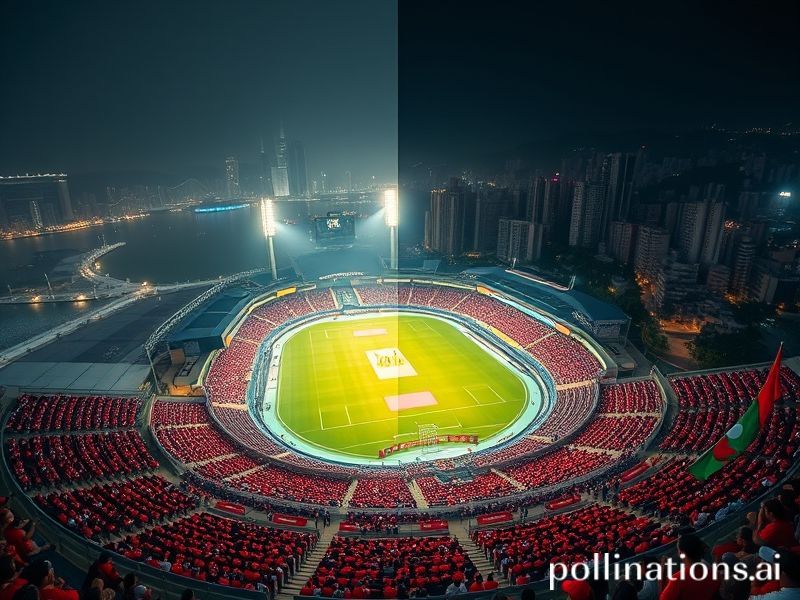Hong Kong vs Bangladesh: When the Global Economy Swaps Scripts and Miracles Unravel at the Seams
Hong Kong vs Bangladesh: When a Glittering Finance Hub Discovers Gravity
By Our Correspondent Who Has Watched Too Many “Emerging Market” PowerPoints Burst into Flames
HONG KONG—If you squint past the harbor-front Chanel billboards, you can almost see the moment Hong Kong’s self-image slipped on a banana peel labeled “GDP per capita.” On the same April weekend, 2,400 kilometers southwest, Bangladesh was busy not slipping. While the Fragrant Harbor posted a dainty 1.2 % quarterly growth—roughly the speed at which paint dries in the subtropics—Dhaka announced 5.8 %, fast enough to keep its 170-million-person conga line moving and still spare a few watts to flood Facebook with beach-filtered selfies.
The international press, ever hungry for a tidy horse race, immediately declared a new “Asian derby.” Analysts in London who couldn’t find Chittagong on a dinner plate suddenly opined about garment-assembly throughput, while hedge-fund interns in Midtown updated pitchbooks titled “Why Bangladesh Is the New Vietnam (Which Was the New India).” Somewhere in Davos, a panelist sipping US $18 sparkling water hailed “South-South ascendance,” which is code for “We’d rather not mention China or the Fed right now.”
Global implications? Start with supply-chain karma. Europe’s boutiques are stuffed with US $6 T-shirts born in Bangladeshi mills; should Dhaka’s growth falter, the fast-fashion addict in Berlin might have to pay US $7 and—brace yourself—wear it twice. Conversely, if Hong Kong’s property deflation deepens, the city’s legion of shadow bankers will have to liquidate something. Cue a fire sale of London flats, Vancouver penthouses, and, with any luck, a Premier League team or two, thus marginally improving UK housing justice and English football in one glorious bankruptcy.
Investors pretend these two places exist in separate Excel tabs, but capital flows are promiscuous. When Hong Kong’s interbank rate ticked above the garment sector’s borrowing costs in Dhaka, a Swiss commodity house yanked cotton credit lines faster than you can say “OECD risk weighting.” Result: Bangladeshi factory owners now pray nightly that Hong Kong’s beleaguered shoppers keep ordering tailored chinos—ironic, given that half the protesters who marched in 2019 wore Bangladeshi denim while demanding economic justice. Somewhere in the cosmos, a supply-chain deity is laughing so hard it dropped its Starbucks.
Then there is the demographic punchline. Hong Kong’s median age is 45; Bangladesh’s is 28. One territory stockpiles gerontocrats who remember British passports the color of overcooked salmon; the other has 65 % of its population young enough to believe “pension” is a misspelling. The world, aging at roughly one funeral per Bond film, needs taxpayers. Bangladesh’s conveyor belt of humans arrives just in time to fund everyone else’s retirement, provided climate change doesn’t turn the delta into an aquarium first. Hong Kong, meanwhile, imports nurses from Manila and guilt from Beijing, a swap even the most creative investment banker struggles to securitize.
Diplomatically, the contest is a Rorschach test. Washington hawks tout Bangladesh as a “stable Muslim democracy,” which is Beltway-speak for “Not China, yet.” Beijing placidly reminds Hong Kong that one-country-two-systems includes the system in which your growth slows, your expats flee, and your bar districts echo with the sound of quarterly-rent sob stories. The EU, ever the conscientious objector, praises both sides for “cooperation on sustainable stitches” and quietly sells surveillance gear to whoever clicks “add to cart.”
What does it all mean for the average planetary citizen? Simple: the center of global poverty is shifting, and the gift shop is relocating. Yesterday’s headlines warned you about Chinese overcapacity; tomorrow’s will scold Bangladeshi wage inflation. Meanwhile, Hong Kong’s role mutates from capitalist speedboat to cautionary fable—proof that even cities with more Louis Vuitton stores than public toilets can discover gravity.
So place your bets, dear readers. Will Dhaka’s rickshaws outrun the next monsoon? Will Hong Kong’s bankers learn to budget without a billionaire’s subsidy? The smart money is hiding in Singapore, chuckling into its kaya toast. The rest of us are stuck here on Earth, watching two starkly different futures wrestle for the same spreadsheet—and discovering, yet again, that economic miracles, like cheap suits, tend to unravel at the seams.







